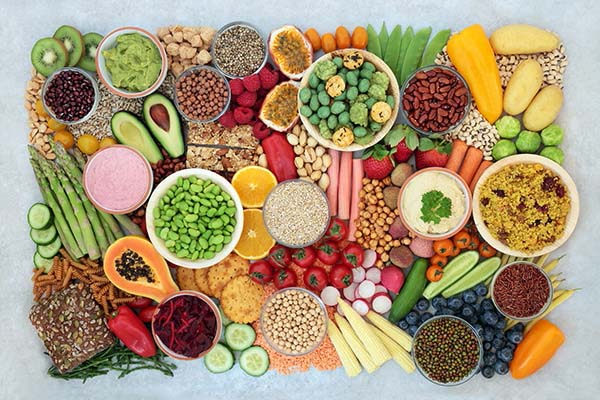What Makes Plant Based Chicken the Go-To Protein for Health Enthusiasts?
What Makes Plant Based Chicken the Go-To Protein for Health Enthusiasts?
Blog Article
Everything About Healthy Food: Benefits of Taking On Plant Based Options
The discussion bordering plant-based diet plans has actually gotten significant focus in recent times. Many people are discovering the potential health and wellness advantages, dietary benefits, and ecological effects associated with these nutritional options. As individuals end up being a lot more familiar with their food's impact on wellness and sustainability, concerns develop regarding the practicalities of adopting such a lifestyle. What specific changes can one anticipate, and just how might these choices reshape not just personal health yet additionally the earth's future?
Recognizing Plant-Based Diet Regimens
Although numerous individuals link plant-based diet plans mostly with vegetarianism or veganism, these diet regimens can incorporate a variety of eating patterns that prioritize entire, minimally refined plant foods. Such diets often include fruits, vegetables, entire grains, seeds, nuts, and beans, while getting rid of or limiting animal products. This flexibility allows people to customize their nutritional choices according to dietary demands and individual choices. Some may embrace a primarily plant-based diet plan while still sometimes consuming meat or milk, typically described as a flexitarian technique. The emphasis remains on including more plant foods, which can bring about a diverse selection of meals and flavors. Recognizing these numerous analyses of plant-based eating is important for appreciating its availability and charm in contemporary food society.
Wellness Perks of Plant-Based Foods
The health and wellness advantages of plant-based foods are significant, supplying a nutrient density benefit that sustains general wellness. Research study indicates that these foods can enhance heart wellness and play an essential function in effective weight administration. By incorporating much more plant-based options, individuals might enhance their dietary selections and promote long-lasting health.
Nutrient Thickness Benefit
Nutrient thickness plays an essential duty in the health and wellness benefits of plant-based foods, making them an engaging option for those looking for a well balanced diet plan. Plant-based foods, such as fruits, vegetables, beans, nuts, and whole grains, are commonly rich in crucial vitamins, minerals, and antioxidants while being reduced in calories. This high nutrient density allows individuals to consume fewer calories while still satisfying their dietary demands. Furthermore, these foods are loaded with nutritional fiber, promoting digestive health and wellness and helping in weight monitoring. By integrating nutrient-dense plant-based choices, customers can boost their general wellness, sustain their immune systems, and minimize the danger of chronic conditions. Eventually, the nutrient thickness of plant-based foods highlights their importance in a health-conscious way of life.
Heart Health Improvement

Weight Administration Assistance
Along with advertising heart health and wellness, a plant-based diet regimen can substantially help in weight monitoring. This dietary technique highlights whole foods such as fruits, veggies, beans, nuts, and entire grains, which are generally lower in calories and higher in fiber contrasted to animal-based products. The high fiber material aids raise satiation, reducing general calorie consumption. Furthermore, plant-based diet plans are frequently abundant in vital nutrients while low in undesirable fats, making it easier to preserve a healthy weight. Gluten Free BBQ Sauce. Research study suggests that individuals that take on a plant-based way of life have a tendency to have reduced body mass indexes (BMIs) and experience more effective weight-loss contrasted to those who consume meat-heavy diet regimens. As a result, accepting plant-based options is a tactical choice for effective weight management
Nutritional Value of Plant-Based Components
Plant-based components are rich in important nutrients, supplying a diverse array of vitamins, minerals, and antioxidants that add to general health. A comparison of protein resources reveals that while animal items are often considered as exceptional, lots of plant-based choices provide ample healthy protein and various other useful compounds. Comprehending the nutritional worth of these active ingredients can help individuals make informed nutritional choices.
Essential Nutrients in Plants
Nutrient-rich active ingredients discovered in plants provide a diverse selection of vital nutrients that contribute significantly to general health and wellness. These components are abundant in vitamins A, C, and K, which support immune function, vision, and blood clotting, specifically. Additionally, plants provide vital minerals such as potassium, calcium, and magnesium, crucial for heart health, muscle function, and bone strength. The presence of fiber in plant-based foods aids digestion and promotes a healthy and balanced gut microbiome. Antioxidants, discovered abundantly in fruits and vegetables, help battle oxidative anxiety and reduce inflammation. Many plant foods are low in calories yet high in nutrients, making them an outstanding selection for those seeking to maintain a healthy weight while making sure perfect nutrient consumption.

Contrasting Healthy Protein Resources
Healthy protein sources vary considerably in their nutritional profiles, with plant-based active ingredients providing unique advantages. Unlike animal proteins, which often consist of hydrogenated fats and cholesterol, plant healthy proteins often tend to be reduced in these harmful parts. Legumes, nuts, seeds, and whole grains are rich in important amino acids, fiber, vitamins, and minerals. Lentils provide high healthy protein content alongside significant iron and folate, while quinoa is a total protein, providing all 9 crucial amino acids. Furthermore, plant-based proteins are often accompanied by anti-oxidants and phytochemicals that sustain general wellness. The change to plant-based protein resources not just boosts nutritional consumption however additionally aligns with lasting nutritional methods, reducing ecological impact and promoting lasting health and wellness benefits.
Environmental Effect of Plant-Based Eating
As recognition of climate modification grows, many individuals are discovering lasting nutritional choices that can greatly reduce their ecological footprint. Plant-based eating has actually emerged as a significant contributor to reducing greenhouse gas emissions, which are largely linked with livestock manufacturing. The farming of fruits, grains, legumes, and vegetables normally needs fewer sources, such as water and land, contrasted to pet farming. In addition, plant-based diet plans can result in decreased deforestation, as much less land is needed for grazing livestock or expanding animal feed. By shifting towards plant-based choices, customers can sustain biodiversity and discover this advertise much healthier ecological communities. In general, accepting plant-based eating not only benefits personal health however likewise represents an important action toward ecological sustainability and conservation initiatives.
Conquering Common Misconceptions
While many individuals acknowledge the benefits of a plant-based diet regimen, a number of misunderstandings usually hinder them from completely welcoming this way of living. An usual belief is that plant-based diets lack adequate healthy protein; however, various plant sources, such as legumes, nuts, and tofu, give ample healthy protein. Additionally, some think that this diet is costly, when actually, staples like beans, rice, and seasonal veggies can be fairly affordable. Another mistaken belief is that plant-based consuming is excessively restrictive, whereas it actually offers a diverse selection of foods and tastes. Lots of fret that a plant-based diet regimen may lead to shortages, yet with appropriate planning, people can acquire all essential nutrients, consisting of minerals and vitamins, while appreciating a vast range of scrumptious meals. Broad Tips for Transitioning to a Plant-Based Way of living
Making the shift to a plant-based way of living can be an enriching experience, though it typically calls for some support to navigate the initial adjustments. First, individuals are urged to begin progressively, incorporating more fruits, vegetables, legumes, and entire grains right into their dishes while decreasing meat and milk consumption. Dish preparation is vital; preparing a weekly menu can assist ease the modification and prevent last-minute unhealthy selections. Checking out brand-new dishes and cooking approaches can also enhance the experience and preserve exhilaration concerning plant-based eating. Additionally, signing up with support teams or neighborhoods can give inspiration and share important tips. Finally, remaining informed regarding nourishment warranties well balanced dishes, preventing deficiencies while cultivating a healthy and balanced, rewarding plant-based way of living.
Delicious Plant-Based Dish Concepts
Discovering delicious plant-based meal ideas can inspire people to accept an extra nutritious diet regimen. One preferred option is a passionate quinoa salad, featuring cherry tomatoes, cucumber, and a spicy lemon-tahini clothing. Another fave is a savory lentil stew, packed with carrots, celery, and great smelling natural herbs, best for a reassuring dinner. For morning meal, overnight oats made with almond milk, chia seeds, and topped with fresh berries supply a nutritious begin to the day. Additionally, a vibrant vegetable stir-fry with tofu and a range of colorful veggies can be a quick yet pleasing meal. Lastly, velvety avocado toast on whole-grain bread, sprinkled with flavors and seeds, supplies an easy yet tasty snack. These dishes display the selection and richness of plant-based consuming.

Often Asked Concerns
Can a Plant-Based Diet Plan Supply Enough Protein?
The concern of whether a plant-based diet plan can provide sufficient healthy protein is typical. Countless resources, including vegetables, nuts, seeds, and entire grains, can meet protein needs properly, sustaining a nutritious and balanced diet for people.
Are Plant-Based Diets Ideal for Children?
The viability of plant-based diet plans for kids depends on mindful preparation. Sufficient nutrients should be ensured, consisting of vitamins, proteins, and minerals. With appropriate advice, such diet regimens can support healthy growth and growth in children.
Just how Do I Eat in restaurants on a Plant-Based Diet plan?
Eating in restaurants on a plant-based diet plan includes looking for restaurants with diverse menus, asking for modifications, and checking out vegan-friendly options. Preparation in advance and connecting nutritional choices can enhance the eating experience while maintaining nutritional options.
What Are Typical Irritants in Plant-Based Foods?
Typical irritants in plant-based foods consist of soy, gluten, nuts, and seeds - BBQ Sauces. Individuals adhering to a plant-based diet plan must understand these irritants and read tags carefully to stay clear of unfavorable reactions and assure safe consumption
Can Plant-Based Diets Assist With Weight Management?
Study indicates that embracing a plant-based diet plan may help with weight-loss because of its commonly lower calorie density and greater fiber content. This mix can improve satiation, assisting people manage their caloric consumption properly. Lots of people associate plant-based diet plans mostly with vegetarianism or veganism, my response these diet plans can incorporate a vast variety of eating patterns that focus on whole, minimally processed plant foods. Nutrient density plays an essential role in the health advantages of plant-based foods, More Info making them an engaging selection for those seeking a balanced diet. Plant-based diets have actually been revealed to considerably improve heart wellness, as they often consist of elements that support cardiovascular feature. In addition to advertising heart wellness, a plant-based diet regimen can substantially help in weight management. A typical idea is that plant-based diet regimens lack enough healthy protein; nevertheless, many plant resources, such as vegetables, nuts, and tofu, offer enough healthy protein.
Report this page